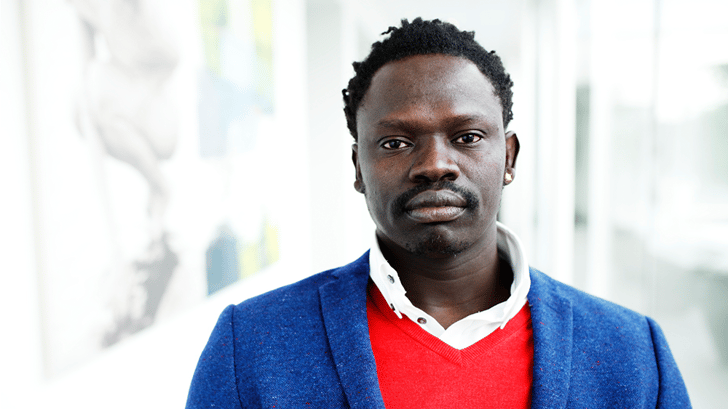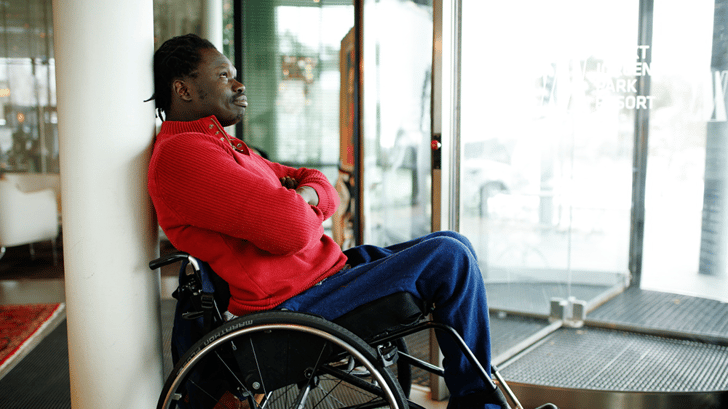Born in Southern Sudan, injured in Egypt and living in Norway, I have experienced many kinds of medical care. This is my journey to a working bladder routine after suffering a spinal cord injury.

When I got injured, my life changed completely and it took a while before I fully understood its impact. I was convinced that I would walk again, and thought that all these changes were temporary. Maybe that was why I could endure four tough years; in a bed, without a wheelchair, without the ability to walk, with very little control over my life whatsoever, while often in a lot of pain.
A big change for me was the fact that I no longer could go to the toilet as normal. I didn’t have control over urination. I knew when I needed to go and that was a very awful feeling - the feeling of helplessness. It’s a rather private matter and as a 16-year-old boy I did not like the idea of using an indwelling catheter. I was embarrassed whenever I got visitors because I could see that they looked at the urine bag hanging by the side of my hospital bed. The only positive thing about having a indwelling catheter was that I didn’t have to move to actually go to the toilet. I was in a great deal of pain and even the thought of moving was horrible. Back then, when I still believed that this all was just temporary, I never knew the long-term consequences of using an indwelling catheter.
I have reflected about how much trouble the catheter caused. When I first got it, there was no focus on educational information or training. No medical staff told me how essential it is to maintain good hygiene around catheterization. Especially when using an indwelling catheter, because there is a big risk of developing urinary infections. The sphincter of the bladder also gets weaker and leads to bladder leaks in the long-term. This is the kind of information I would have appreciated. I could have avoided a lot of problems.
The selection of indwelling catheters in Egypt were few and I always had catheters that were too small. The result was that they leaked a bit and the bed would get wet from the urine. I felt guilty and embarrassed about it. I felt it as a defeat when I had to ask for help to change the bedsheets. Unfortunately, access to aids and medical equipment were not that great in Egypt in the nineties. There were no other options and I try not to be too vexed about how much the indwelling catheter damaged my health later in life.
When I got discharged from the hospital I got sent home, with my family. I never had a wheelchair, so I was completely bedridden. Youth is the time when you’re supposed to be everywhere but home in bed. This was something that bothered me a great deal. Luckily, I had both family and friends who came and visited. I felt extra bad about being bedridden, and using an indwelling catheter when girls visited me. Like every other boy that age I was very interested and curious about having a sex life. With an SCI, your sex life changes, and it takes time to find and explore ways to feel satisfied. I also believe that getting injured at a young age makes you even more insecure, since you don’t have that much experience from before.

It happened more than once that I was going to have sex with a girl and I felt very insecure. Not because I was afraid of being different, but because I had this indwelling catheter. What was I supposed to do? No doctors or anyone else had talked to me about this or offered any support. And they had absolutely failed to tell me about the consequences of taking the matter into my own hands.
I took out the indwelling catheter myself. It was a big saline balloon and you can imagine what kind of pain this caused. I was bleeding and the girl was naturally completely freaked out. But something happened that I didn’t expect; she got impressed! Because, if I could go through that kind of pain to have sex with her, she had to be special. It was a massive relief when I learned that she felt that good about it.
Today I understand how stupid and dangerous this was, but it’s exactly these kind of things that makes it difficult on so many levels to use an indwelling catheter in countries with little or no focus on education and training. There is too little information and most certainly too little visibility and dialogue. Sex and sexual life are topics that remain taboo to talk about. I learned the hard way that taking out an indwelling catheter in the heat of the moment is not very clever.
As you can see, I have had my troubles with indwelling catheterization. There have been more urinary infections and antibiotic treatments than I care to remember.
When I came to Norway I understood for the very first time that I was most likely never going to stand up and walk again. I then I understood that I was never going to use the toilet as I had before the injury. But among all the bad news was a bright spot; disposable catheters. It was a whole new world to me.
It felt almost like being able to go to the toilet as normal. There was no longer a urine bag hanging by the side of my bed, and I could control when I was going to urinate. It was about a year after moving to Norway that this was first introduced to me. At the hospital, I was shown how to use Clean Intermittent Catheterization (CIC) and taught how important it was with hygiene and sterility. All this information is so important, and I realized how little I understood when I lived in Egypt.
Now you might think that using disposable urinary catheters comes without any cons. Of course I would prefer to be able to go to the toilet as normal, but when that’s not possible I just have to make the best of it. I’ve described the indwelling alternative and that is much, much worse. It is no secret that using disposable catheters can be complex. For me it hurts a bit and the risk for urinary infections are still quite big, so it’s important to establish good routines.
I go to the toilet and use catheters six times every day. Six times each day I am reminded that I haven’t been able to go to toilet like normal in about twenty years. That hurts to think about, so instead, each day, six times a day, I think about how grateful I am for the quality medical equipment I have. Just the fact that there exists better options than an indwelling catheter and that there is no stigma to talk about everything around this.
If I’m honest, I even miss the feeling of standing in line, queuing for the toilet, regretting that I waited too long and that feeling of satisfaction when finally reaching the toilet. At the same time, I am very happy that at least disposable catheters can give me back some of that experience. Being able to decide when you are going to the toilet is something I do not take for granted. It’s great that the quality and selection of disposable catheters keeps getting better. I still experience urinary infections, but with constantly improved equipment and good routines it gets easier to avoid.
Disposable catheters have given me the feeling of being normal again, and that means everything.
Kissinger Deng





